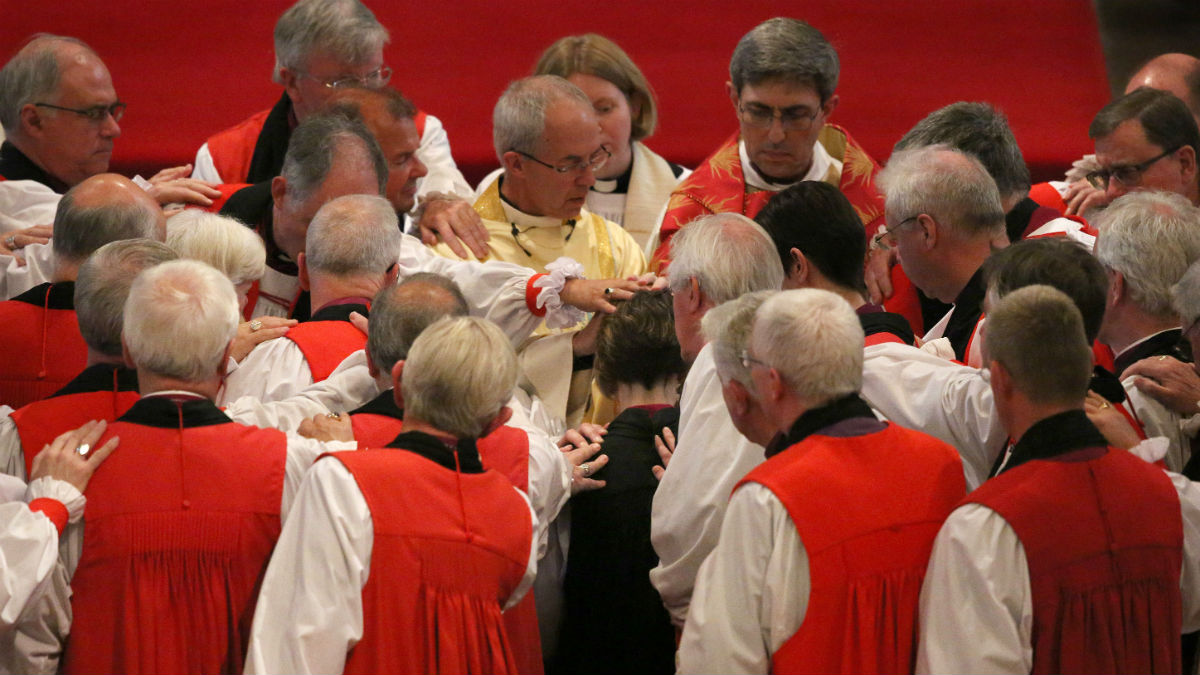Church of England takes 'step towards gay marriage'
General Synod rejects report saying church ceremonies should only be between a man and a woman

A free daily email with the biggest news stories of the day – and the best features from TheWeek.com
You are now subscribed
Your newsletter sign-up was successful
The Church of England General Synod has taken "a step towards gay marriage" in churches, the Daily Telegraph reports.
Members voted against a bishops' report saying marriage in church should only be between a man and a woman and services should not be held to bless same-sex relationships.
The report had been criticised by equality campaigners, who said the church was also adopting a "don't ask, don't tell" policy on gay clergy – a reference to the former US military policy.
The Week
Escape your echo chamber. Get the facts behind the news, plus analysis from multiple perspectives.

Sign up for The Week's Free Newsletters
From our morning news briefing to a weekly Good News Newsletter, get the best of The Week delivered directly to your inbox.
From our morning news briefing to a weekly Good News Newsletter, get the best of The Week delivered directly to your inbox.
What did the report say?
Marriage and Same Sex Relationships after the Shared Conversations suggests new teachings on marriage and relationships should be drawn up to replace those introduced in the 1990s. While rejecting the idea of changing policy on same-sex relationships, it says the new teachings should provide "maximum freedom" for gay couples and clergy.
What was the reaction?
Members of the lesbian, gay, bisexual, trans and intersex (LGBTI) community had expressed anger that, after engaging in three years of so-called "shared conversations", the bishops had decided not to recommend any change to church practice. Campaigner Peter Tatchell welcomed the synod's rejection of the report and called it a "victory for love and equality".
A free daily email with the biggest news stories of the day – and the best features from TheWeek.com
He added: "The bishops' report treats LGBTI clergy and laity as second class, both within the church and the wider society."
What was said last night?
Many bishops struck a conflicted or conciliatory tone. The Bishop of Willesden, the Rt Rev Pete Broadbent, said he did not want to "attempt an exercise in self-justification".
The Bishop of Norwich, Graham James, said he regretted any "pain or anger" the report may have caused.
-
 Why are election experts taking Trump’s midterm threats seriously?
Why are election experts taking Trump’s midterm threats seriously?IN THE SPOTLIGHT As the president muses about polling place deployments and a centralized electoral system aimed at one-party control, lawmakers are taking this administration at its word
-
 ‘Restaurateurs have become millionaires’
‘Restaurateurs have become millionaires’Instant Opinion Opinion, comment and editorials of the day
-
 Earth is rapidly approaching a ‘hothouse’ trajectory of warming
Earth is rapidly approaching a ‘hothouse’ trajectory of warmingThe explainer It may become impossible to fix
-
 Epstein files topple law CEO, roil UK government
Epstein files topple law CEO, roil UK governmentSpeed Read Peter Mandelson, Britain’s former ambassador to the US, is caught up in the scandal
-
 Iran and US prepare to meet after skirmishes
Iran and US prepare to meet after skirmishesSpeed Read The incident comes amid heightened tensions in the Middle East
-
 Israel retrieves final hostage’s body from Gaza
Israel retrieves final hostage’s body from GazaSpeed Read The 24-year-old police officer was killed during the initial Hamas attack
-
 China’s Xi targets top general in growing purge
China’s Xi targets top general in growing purgeSpeed Read Zhang Youxia is being investigated over ‘grave violations’ of the law
-
 Panama and Canada are negotiating over a crucial copper mine
Panama and Canada are negotiating over a crucial copper mineIn the Spotlight Panama is set to make a final decision on the mine this summer
-
 Why Greenland’s natural resources are nearly impossible to mine
Why Greenland’s natural resources are nearly impossible to mineThe Explainer The country’s natural landscape makes the task extremely difficult
-
 Iran cuts internet as protests escalate
Iran cuts internet as protests escalateSpeed Reada Government buildings across the country have been set on fire
-
 US nabs ‘shadow’ tanker claimed by Russia
US nabs ‘shadow’ tanker claimed by RussiaSpeed Read The ship was one of two vessels seized by the US military